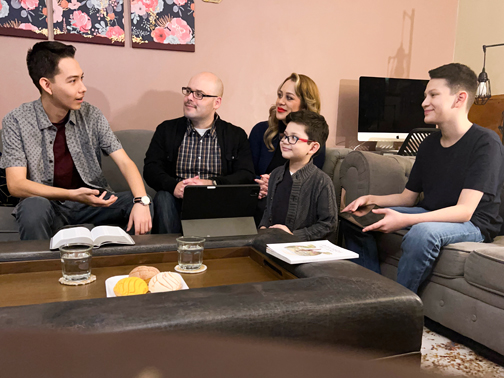
The stream of tough topics for parents to explain can feel unending: social unrest, hate crimes, natural disasters … the pandemic. Many children and teens have struggled to process what they see at school, in their neighborhoods and on the news.
The Quimby family of Pasadena created a space in their living room to talk about this and other topics every Thursday evening.
“This is a comfortable place with our feelings and with ourselves. It’s a no-judgment zone that fosters love and instruction,” said Daisy Quimby, who works in Burbank, regarding their weekly family time.
“The setting really helps them to express themselves,” said her husband, Santos. He feels this time provides an opportunity to tap into the spiritual side of their three sons, who range in age from 6 to 17.
That family time became crucial for them over the summer of 2020. Recalling one evening that stood out, Santos said, “I’m watching the news live, and they’re watching this and realizing it’s not a movie. It’s really happening.”
The concerned looks on their sons’ faces made it clear that the images of rioting and violent protest they just saw needed to be discussed as a family right away. He added, “We explained why it was happening. We didn’t hesitate.”
In an ever-changing and challenging world, experts recommend regular family discussions to help young ones build resilience.
“Good communication is essential for a child’s survival in this world,” said James Wright, a California-based family counselor and conflict resolution mediator. “Why not have a family discussion once a week and talk about what’s going on in your lives?”
The Quimbys are not alone in holding regular family discussions. For nearly two decades, families of Jehovah’s Witnesses around the world have been encouraged to make “family worship” an uninterrupted weekly routine.
“For many of our families, their weekly discussions are among the most important hours of the week,” said Robert Hendriks, U.S. spokesman for Jehovah’s Witnesses. “It has brought thousands of our families closer together and helped children feel safe and loved.”
In 2009 Jehovah’s Witnesses reduced their midweek meetings from two to one, freeing up an evening each week for families to enjoy more time together.
“Meeting in large groups for worship is a Bible command, but the Bible also tells parents to make time to talk with their kids,” Hendriks said. “The change to our weekly meetings helped families to prioritize unhurried Bible discussions tailored to their needs.”
For the Cariagas of Lomita, their weekly discussion provided a time to promptly address racism when their three girls saw news reports about hate crimes targeting their Asian community.
“The articles on jw.org about prejudice and the video about anxiety really helpful,” said mom Lorrie Cariaga, referencing free resources on the official website of Jehovah’s Witnesses where they often turn for practical and Scriptural solutions to family concerns.
Along with serious topics, the Cariagas mix singing, dramatic performances and hiking in their family worship together.
“Family time is like an open space; it’s relaxed, and it’s always fun,” Sophie said, 14.
Family nights provide something else that is priceless for the Quimbys – unity and courage in a divided world.
“We do everything as a family. It’s always the five of us,” Santos said. “It’s the glue that helped everything come together. We’re working as one unit.”
